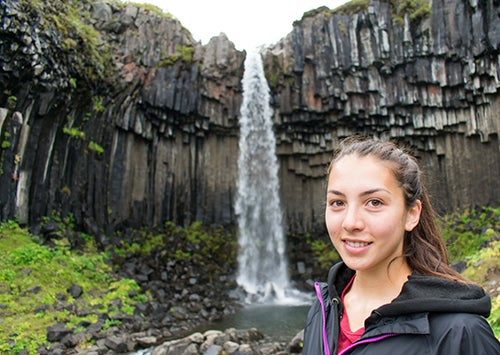“My life has always been intertwined with water in one way or another,” realized Lizz Webb, who recently completed her master’s degree in applied mathematics at the University of Waterloo. As the captain of the swim team in high school, Webb has always loved swimming and lifeguarding, but she never expected to build a career at the intersection of mathematics and ocean sciences.
As an undergraduate mathematics student at McMaster University, Webb first dipped her toes in the study of fluids when she applied numerical analysis to tsunami modelling for her senior thesis. During her time at McMaster, she attended a lecture delivered by Dr. Francis Poulin, who would go on to become her master’s supervisor in the Fluid Mechanics lab at Waterloo Math. “Dr. Poulin delivered a presentation on ocean circulation that captured my interest,” remembered Webb. “When he mentioned an opening on his research team, I turned in my application to Waterloo.”

Webb’s final master’s thesis, which she recently defended, uses numerical methods to model the flow of the Beaufort gyre and identify instabilities that could lead to increased ice melting rates. “I’ve really enjoyed applying a mathematical lens to this particular issue, which is a largely a question mark given the limited windows of time that scientists can conduct fieldwork in the Arctic,” she expressed.
During her time at Waterloo, Webb was a student in the Water Collaborative Program to broaden her exposure to water-related problems in collaboration with students from other disciplines. “I was required to take two courses from the Water Institute, and they were completely different from anything I had experienced before,” she shared. “I ended up finding enormous value in learning alongside an interdisciplinary group of students from every faculty, including the environmental sciences and public health programs.” In several of her classes, she was one of only two mathematics students in a crowd of 60.
As she looked toward graduation, Webb’s experience in the Water Collaborative Program heavily influenced her decision to continue researching the fluid dynamics of the Arctic Ocean in an interdisciplinary environment. In early 2021, she will begin a doctoral degree in Atmosphere and Ocean Sciences at McGill University. “I’m grateful for the way my master’s degree has not only opened doors to other projects in the Arctic and geophysical fluid dynamics, but has also demonstrated the power of collaborating across disciplines,” she concluded. “I’m excited to build on the foundation I laid at Waterloo.”